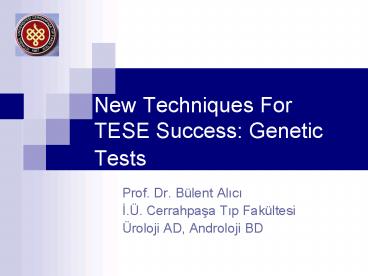New Techniques For TESE Success: Genetic Tests - PowerPoint PPT Presentation
1 / 23
Title:
New Techniques For TESE Success: Genetic Tests
Description:
To yield a diagnosis and etiology For genetic counselling Prevent unnecessary medical or surgical treatment 2. ... Genetic Risks in Male nfertility ICSI ... – PowerPoint PPT presentation
Number of Views:162
Avg rating:3.0/5.0
Title: New Techniques For TESE Success: Genetic Tests
1
New Techniques For TESE Success Genetic Tests
- Prof. Dr. Bülent Alici
- I.Ü. Cerrahpasa Tip Fakültesi
- Üroloji AD, Androloji BD
2
Treatment Options
3
Why do we evaluate men in the era of ICSI?
- To distinguish treatable causes
- Decision of necessity for artificial
insemination techniques - To diagnose genetic risks if AI is needed
- To diagnose the life treatening conditions seen
with infertility
4
Genetic Risks in Male Infertility
- 10-15 of men with azoospermia and 5 of men
with oligozoospermia have chromozomal
abnormalities - AUA, EAU Guidelines
- After sperm retrieval/ICSI
- Chromozomal abnormalities 3x
- Malformations 2x
5
ICSI Genetic Risks
- Malformation
- IVF 1.4
- ICSI 2.35
- Malformation ICSI/IVF risk ? 1.27
- Dietrich et al. 2004
6
Aging Fathers Genetic Risks for the Children
- Structural chromosomal anomalies
- Autosomal dominant transferrable diseases
- (Polycystic renal degeneration, tubular
sclerosis) - Age of the partner decisive for the indication
of a pre-implantation diagnosis
7
Why Do We Need Genetic Investigation?
- To yield a diagnosis and etiology
- For genetic counselling
- Prevent unnecessary medical or surgical treatment
8
Sperm of Infertile Men
- Aneuploidy
- Genetic abnormalities
- DNA damage
9
Chromozomal Abnormalities
- Numerical (trisomy e.t.c.)
- Structural (inversions or translocations)
10
- 11 publications, n 9766 infertile men
- Chromozomal abnormalities 5.8
- Sex chromo. abnorm 4.2
- Autosomal abnorm 1.5
- Johnson MD Fertil
Steril. 1998397-411 - New born male infants (n 94.465)
- Chromozomal abnormalities 0.38
- Sex chromo. abnorm 0.14 Autosomal
abnorm 0.25 - Van Assche EV Hum Reprod. 1996
Suppl 41-24
11
Klinefelters Syndrome
- Chromosome disorder
- a. Classic form 47 XXY (90) results from
meiotic nondisjunction - b. Mosaic form 46 XY/47 XXY (10)
- Karyotopic varieties XXYY, XXXY e.t.c.
- Very common 1/500 male births
I.Ü. CTF Üroloji AD Arsivi
12
Genetic Counseling
- AZFa, b ve c deletions on long arm of Y
chromosome may have a prognostic value
13
Y Microdeletions
- Specific microdeletion frequency
- AZFa 5
- AZFb 35
- AZFc 60
- Krauzs C, Int J Androl, 2003
14
Y Microdeletions
- Patients with AZF microdeletion
- Azoospermia 66
- Severe Oligozoospermia 28
- Oligozoospermia 6
- Y microdeletion in azoospermia 7 (2-53)
- Koh E et al, Reprod.Med. 2005
15
Y Microdeletion and Histopathology
- AZFa
- Sertoli Cell Only
- AZFb
- Maturation arrest
- AZFc
- Different histopathological changes
- Koh E et al, Reprod.Med. 2005
16
Y Microdeletion and Histopathology
17
Chance of Sperm Retrieval
- AZFc
- Partial AZFc
- Partial AZFa and AZFb
- AZFa
- AZFb
- AZFbc
- AZFabc
50-70 chance
No chance of sperm retrieval
18
Sperm Retrieval Rate According to Histopathology
- Hypospermatogenesis 90
- Maturation Arrest 60-70
- SCO (Germinal Aplasia) 30
- Over-all Success 50-60
19
Translocations in Men
- Neonatal population 0.2
- Infertile couples 0.6
- Severe infertility 2-3.2
- Recurrent miscarriages 9.2
- Stern C, Hum Reprod 1999142097101
- Meschede D, Hum Reprod 19981357682
20
Translocations and Fertility
- Preimplantation genetic diagnosis (PGD) has been
offered to carriers of translocations - By selecting only normal and balanced embryos
after PGD higher chance of conceiving
reduced probability of abortions - Patients with 65 or less chromosomally abnormal
sperm have a good chance at conceiving - Escudero T et al Fertility Sterility 2003
79 1526-33 - Munne S et al, Fertil Steril 200073120918
21
What Genetic Testing Should be Offered?
- For patients with NOA or counts lt 5-10 mil/ml
- Karyotyping Chromozomal deletions, duplications
or translocations - Y Chromosome analysis gene microdeletions
- For patients with vasal agenesis
- CFTR testing to CF mutations
- ? For patients with repeated pregnancy loss
- FISH of sperm
22
Genetic Work-up in Azoospermia
Parameter Clinic Comment
CFTR-Gene (Cystic Fibrosis Transm Regulator) CBAVD (Azoospermia) Patient/Partner
Klinefelter (47xxy) Most Common Sex Chromozome abnormality TESE/ICSI Preimplantation diagnosis
Y microdeletion 10-15 of Testicular azoospermia or severe Oligozoospermia Before TESE/ICSI
23
(No Transcript)

